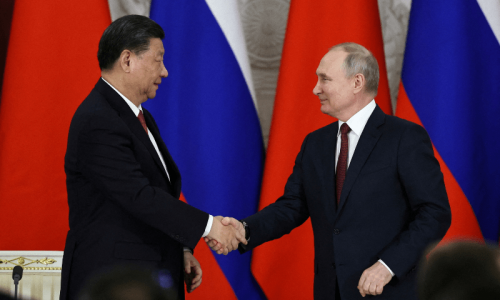WASHINGTON: A US commission on Wednesday recommended for the second year in a row that India be placed on a blacklist of countries where governments allow widespread harassment and violence against religious minorities.
The commission also said the Indian government has been stifling dissent and voiced concern over the rise of restrictions on inter-faith marriages, including in largest state Uttar Pradesh.
“Religious freedom conditions in India are taking a drastic turn downward, with national and various state governments tolerating widespread harassment and violence against religious minorities,” the commission said in its annual report released on Wednesday.
“The BJP-led government enacted the Citizenship (Amendment) Act (CAA), which provides a fast track to Indian citizenship only for non-Muslim migrants from Afghanistan, Bangladesh, and Pakistan already residing in India,” the report noted. “This potentially exposes millions of Muslims to detention, deportation and statelessness when the government completes its planned nationwide National Register of Citizens,” it added.
The US Commission on International Religious Freedom (USCIRF) is a federal government agency created by Congress.
USCIRF Commissioners are appointed by the President and the leadership of both political parties in the Senate and the House of Representatives. It sends recommendations to Congress and the president but does not make policies.
In the 2021 report, USCIRF recommended 14 countries to the State Department for designation as “countries of particular concern” (CPCs) because their governments engage in or tolerate “systematic, ongoing, and egregious violations.”
These include 10 that the State Department designated as CPCs in December 2020 —Burma, China, Eritrea, Iran, Nigeria, North Korea, Pakistan, Saudi Arabia, Tajikistan, and Turkmenistan — as well as four others — India, Russia, Syria, and Vietnam.
The report noted that “religious freedom conditions in India continued their negative trajectory” and the Modi government continued to “promote Hindu nationalist policies resulting in systematic, ongoing and egregious violations of religious freedom.”
The report underlined allegations of police complicity in violence against Muslims during deadly riots last year in New Delhi and noted with regret that the citizenship law, championed by Prime Minister Narendra Modi, defines Muslims as non-Indian.
Last year, the Indian government had reacted angrily to the commission’s recommendation and has often prevented USCIRF delegations from visiting the country to assess the situation.
In the 2021 report, USCIRF also monitored public health measures put in place to prevent the spread of Covid-19, and their impact on freedom of religion or belief. “In some countries, already marginalized religious communities faced official and societal stigmatisation, harassment, and discrimination for allegedly causing or spreading the virus,” the report added.
The report noted that “some governments took advantage of the restrictions to target specific religious communities,” while others took “positive steps” too, such as Eritrea releasing prisoners of conscience.
The 2021 Annual Report further recommended to the State Department seven non-state actors for redesignation as “entities of particular concern” (EPCs) for systematic, ongoing, egregious violations.
The State Department designated all seven of these groups as EPCs in December 2020 — Al-Shabaab, Boko Haram, the Houthis, Hay’at Tahrir al-Sham (HTS), the militant Islamic State in the Greater Sahara (ISGS), Jamaat Nasr al-Islam wal Muslimin (JNIM), and the Taliban.
Published in Dawn, April 22nd, 2021










































